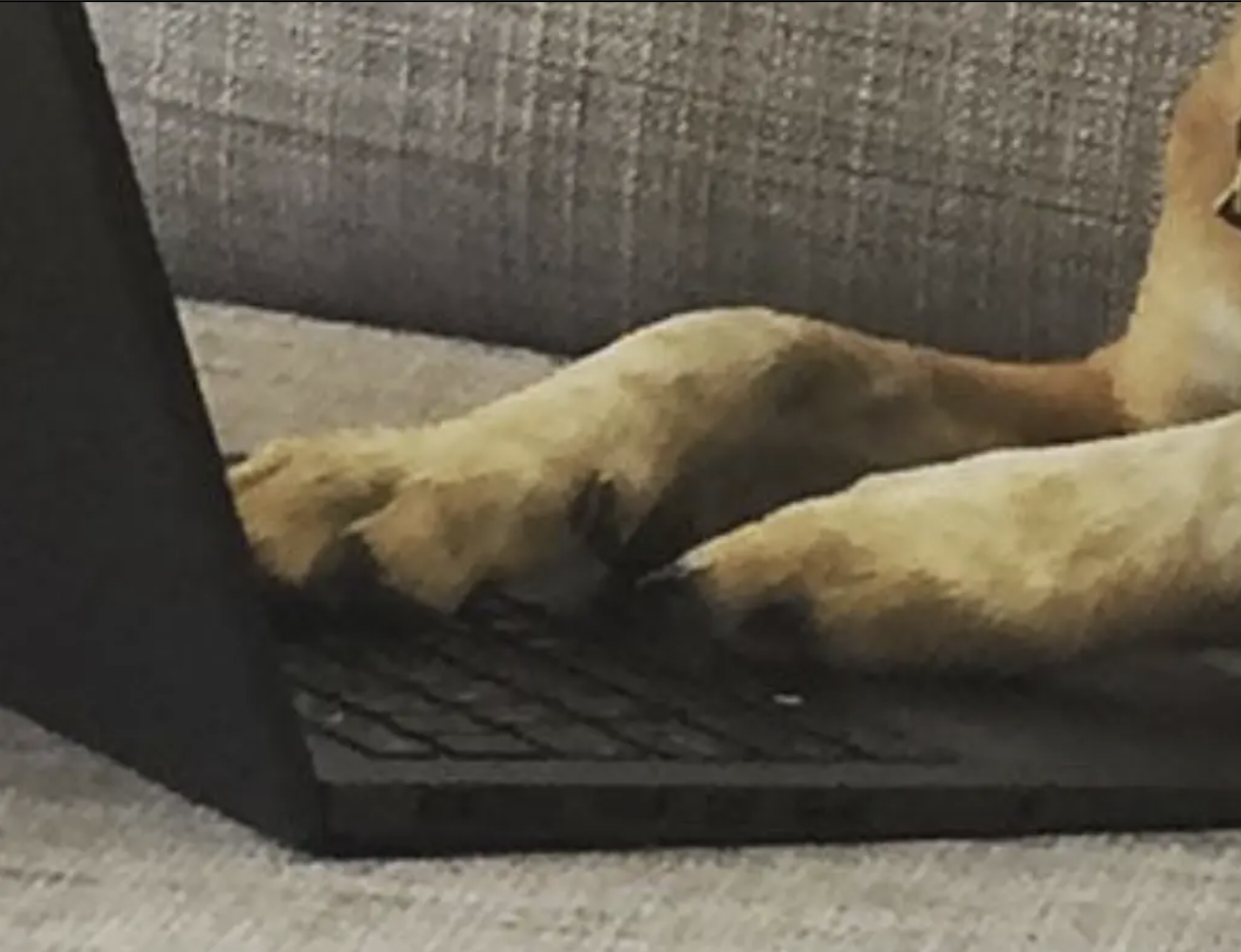There is a great way to monitor employee’s performance. This one weird trick will save you losing your best employees!
Are their tasks getting done on time and with quality work?
Congrats! You just learned how to treat your employees like adults.
Now kindly fuck off and let me continue to work in my underwear.
deleted by creator
I actually like daily standups. I know many don’t, but they can be really useful.
What did you do yesterday. What are you doing today. Any issues for the group?
Then get back to work!
Daily standups are fine, but they need to be like 10-15 minutes tops. And between 10am-1pm. Putting them at 9am sharp is just rude.
A few jobs back the director was having daily standups with the whole dev team for 60-90 minutes and sometimes longer.
The goal was to figure out why the project was behind schedule… yeah.
deleted by creator
What I used to do was make notes at the end of the day. Just a couple short bullet points to say at standup and help me get back on track a little faster the next morning.
deleted by creator
Honestly I like your way better. Makes the ticket easier to hand off. Pocketing that for later.
Ugh. I hate being on the west coast of the US. Most office jobs start at 7 or 8 AM here.
deleted by creator
God, I hear that…plus I usually need to meet with my coworkers in India, so I’m often needing to start meetings at 6 AM. I am nooooot functional that early
I usually had to do that for Europe. Most Indian coworkers I have worked with work a later schedule so there has always been a bit of overlap. Generally the Europeans I have worked with have been German and they generally have a labor rep on the board so they can fight against messed up work schedules.
Heh. Not enough coffee for mondays as it is…
Yeah, check your email, get a bit of a plan, “hey what’s your plan, what’d you do yesterday”
Keeping the meeting short was the whole point of them being “standups” (as opposed to “sit-downs”) in the first place!
Frankly, even 10 minutes is excessive: it means either people are talking too much or your team is too big.
I’m fucking sick and tired of cargo-cult managers adopting the trappings of agile without understanding WTF they’re for.
Ha! Yes.
For the first time, we are trying out a full scrum team in our company, with an external “scrum master” who really seems to know what he’s doing. It’s bloody amazing. Small team, the daily meeting has yet to exceed 10 minutes and is usually <5 minutes, the planning and refinement meeting keeps everyone in the loop. The rest of the time I can just be a happy code monkey :)
My stand-ups are at 10 am (11 am for most of the team), last between 3 and 15 minutes depending on how many of the 7 of us show up and how much everyone has to say, then we all go back to what we’re doing. My project manager and boss both care about the work that gets done rather than monitoring us to make sure we’re working the entire time, and we actually get reasonable (even generous) timelines for most things unless it’s something super important.
I love my job.
Ha, I could not be more the opposite. I want to be 75% done with my day by 1pm. I’d rather them be at 8am
I’m the same way. If I could start work at 5:00 a.m. and be off by noon or 1:00 p.m. I’d be happy. It’s just hard to find people who want to do therapy at 5:00 a.m. 😂
They are out there, in other time zones.
Indeed, move to Alaska then do therapy exclusively for east coasters.
deleted by creator
I’m allowed to set my own hours, so if it was telehealth I could theoretically do late night or morning appointments if I want to. I just haven’t really thought about that. When I eventually have my own practice. I really do want to have weekend hours and evening hours, before I worked with a lot of parents and that was one of the biggest issues was when do you have time for therapy when you’re chasing a toddler. Or like I remember when I would have friends who worked as bartenders, they wished that they could do therapy after they got off work but sometimes that would be two or three in the morning.
Is there some kind of rule that you can’t do any work until the stand-up?
No of course not. It’s just structurally kinda weird. Not the end of the world obviously
This would be a massive waste of time if it were with the whole team every day. I don’t need to know what every other employee on the team is doing every single day, and I don’t need to spend time listening to them explain it. I’ve got shit to do.
My husband holds his team meetings at 3/4pm ish on friday on zoom with beers. Afterwards he tells everyone to fuck off home.
THAT is how you do it. It turns into a pile of geeks talking geek and part post-mortem, part decompressing from the week and they’ve actually had some absolutely mint ideas rising out of deformalising the dev pileup.
Late on a Friday? Yeah, no.
nah yeah, mate. You spend the arse end of your friday workday drinking beer and talking shit in an informal setting and then fuck off early
the problem is, then i a can’t leave at lunch if my shit’s done. And lets be honest, nobody was doing shit on friday anyhow…
I’d rather be doing that on my own time, or something more productive with friends, thanks.
We used to have a rigorous schedule. Arrive at the office between 8-830. Make coffee and chat. At 9am we started the daily meeting. We all read what we were going to do today to each other. By then it was 1130 and so we broke for lunch. After lunch, at 1300 we would do the thing we said we would do. At 1530-1630 we would submit out updates to the project management system and produce tomorrow’s report for us to read to each other. 1700 we would go to the bar then head home around 1830.
When I started working for myself I would usually start around 9 to finish at noon, including travel time.
It wouldn’t be explaining it. It would be your teammates telling everyone where they are on the projects you all work on. If you aren’t working the same projects, then you aren’t on the same team. Or you need sub-teams. If your work is so independent you don’t rely on anyone else’s work and vice versa, then you probably don’t need standups.
I agree with you. That’s why we make our teams small enough in size that standups are 10min max, usually more like 5.
That said, it can be really beneficial to hear that Joe is working on something similar to a thing I’m going to start today. He may be able to give me some lessons learned or point me to a library.
But I completely agree that big teams a make this an annoyance. I used to be on a 20 person team and standups were completely worthless.
Now, we have 3-5 devs per team and it’s usually really quick.
So what if it’s a waste of time. Gotta make the 40 hours anyway.
deleted by creator
eh. i think best practice is smallish teams get everyone together once a week for the stand up. but a supe or somebody makes the rounds daily. five minute check up ‘do you need anything? get you some coffee?’, kind of conversation before going to the next.
it doesn’t impact the team if that one person wants to chat, but also gives people an opportunity to bring up concerns they wouldn’t normally bring up in a group.
largish teams need to be broken into smallish teams.
if i stood up on a video-conference everyone will see my underpants.
I was doing daily technical meetups in the morning so that my team in India and the more local members could stay in sync and ask each other questions. Usually 10 minutes, but occasionally an hour or more when we had to go way out into the weeds.
Do you mean standups where you are actually standing up? Many places I’ve worked have called a daily meeting a “stand-up” but it has been an hour-long sit-down meeting.
Then there are the actual “stand-ups” where the tall guys tower over the group, and the shorter people (typically women) are either talking into the chests of those guys, or they’re craning their necks up at painful angles.
But… but… but…
It’s proving that my 25 years of being paid 3 times as much as the people I “manage” has been a complete scam the entire time!
Hey, if they’re getting all their work done on time, they’re probably not getting enough work /s
And the 9 floating around managers will figure out to send THAT email, right?
Oh. Wait. No. You right.
Dem 9 gonna have 7 pointless meetings.
So frustrating how a remote world is exposing that…
Edit: not sarcastic. Satiracle.
Call me Candide.
My supervisors are the worst with this.
I work a physical labor job and the supervisors are supposed to help with that. What they do instead is idie away chatting and spending inordinate amounts of time “doing” it work.
Thankfully, in a backwards sort of way, after one of them tried dodging their work when the venue needed to be turned over for a city council meeting, our manager has throughly chewed them out.
Still, I don’t have much faith in them, but we’ll see where that goes.
Thats the thing… boses are basically saying that they cant do that. They cant actually measure how productive people are so they fall back on watching them like a hawk
pssshhh underwear.
Is it underwear if it isn’t under anything?
It’s under my ass all day, does that count?
Under where?
Under there.
I like to save that for Casual Friday. It helps the weekend feel special.
You’re overlooking that most managers don’t actually do anything, so they need desperately to justify their positions. I have a manager who has seven hours of meetings every day, five days a week. We make a fucking app. It barely changes month to month. What on earth are you spending 35 hours a week talking about?
The manager has so little to do they just micromanage everyone, and cause a massive backlog of work that doesn’t have to exist.
I always thought that Office Space was satire, but it really is like that in a lot of companies. I spent more time updating managers than doing actual work since I started this position.
So what do you do when it isn’t on time or quality work?
The same thing you’d do if they were working in an office. How does being remote change this?
Are you suggesting that physical punishment is necessary?
The beatings will continue until morale improves
Paddlin’ is only for A+ work. It’s a reward.
No. Is working in an office physical punishment?
Yes. Yes it is.
Why do you need physical access to employees that don’t do their work on time or up to quality?
Training and education have been found to occur better in person than online.
If someone needs help, shouldn’t they be given the best chance at success?
I’m going to want a citation on that. I learn just fine on my own, and I’m sure many others do too. If you’re really concerned about giving people “the best chance at success” rather than just forcing them into boxes then you’d be presenting options.
it probably has to do with the quality of “remote training” materials. my company (contract security), I train new hires in a variety of things including CPR/AED/First Aid… you can definitely tell the difference between people who were given the stupid web-cartoon training vs actual in person training.
hell, the remote training shit had terrible localization issues. (as in, would get our people arrested and charged with felonies… ooops…)
Is requiring all employees to spend multiple unpaid hours in a car during rush hour in order to put them in unattractive cubicals or desks akin to prison cells, where they are only allowed to shit x amounts a day, and where the manager keep looking over the shoulder to see if you are not wasting a minute thinking about anything other than work a punishment?
What do you think?
I don’t tell employees where to live.
Make them a manager, obviously
People rarely get a job with no intention of doing the work. If work is falling behind there’s usually a reason for it that can be fixed.
In the rare case that the person is just taking the mick, warn, punish, fire. In that order.
My company has a management mentorship program for remote employees. The boss actually travels to different employees homes and will stay with them and work with them at their house for the week. This keeps the execs happy enough to know that they’ve got middle management keeping an eye on the employees, while also allowing the remote work with no fuss. It’s an interesting approach for sure.
Is that real? No way in hell I would be hosting my boss for a week. I’m not even sure where they would fit.
No lol. I’m just being dumb
That sounds interesting, but I really wouldn’t want my boss at my home.
Sounds like a solution for when management can’t even pay rent.
Actually it’s simple. Work well done? Cool, the employee is working. This “monitoring” mentality needs to fucking die.
But then how do you justify keeping “middle management” hall monitors on a payroll after admitting they’re pointless?
Well, they could focus on distributing or coordinating things and assembling results, things they now leave to those who’s job it definitively not is.
It’s this thinking that allows the business bro to think that they contribute to the world while they are really no better than you average insurance company.
“In probably unrelated news, remote workers love how they can’t be micromanaged or watched over their shoulders and are frustrated and disoriented by return-to-office plans.”
The kinds of bosses that don’t want me working from home are the exact ones I want to hide at home from. The ones who already aren’t a micromanager I’m actually quite happy to come into the office and work with and around.
Been on both sides and Oof. Luckily now with a boss that’s happy to have me wfh but I don’t take him up on it too much cause I just genuinely like being in the office!
FYI, this posted twelve times, in case you aren’t aware.
You don’t say!
deleted by creator
You said it!
The kinds of bosses that don’t want me working from home are the exact ones I want to hide at home from. The ones who already aren’t a micromanager I’m actually quite happy to come into the office and work with and around.
Been on both sides and Oof. Luckily now with a boss that’s happy to have me wfh but I don’t take him up on it too much cause I just genuinely like being in the office!
Fascinating!
deleted by creator
Employment, right?
The kinds of bosses that don’t want me working from home are the exact ones I want to hide at home from. The ones who already aren’t a micromanager I’m actually quite happy to come into the office and work with and around.
Been on both sides and Oof. Luckily now with a boss that’s happy to have me wfh but I don’t take him up on it too much cause I just genuinely like being in the office!
Fascinating!
The kinds of bosses that don’t want me working from home are the exact ones I want to hide at home from. The ones who already aren’t a micromanager I’m actually quite happy to come into the office and work with and around.
Been on both sides and Oof. Luckily now with a boss that’s happy to have me wfh but I don’t take him up on it too much cause I just genuinely like being in the office!
A unique viewpoint!
The kinds of bosses that don’t want me working from home are the exact ones I want to hide at home from. The ones who already aren’t a micromanager I’m actually quite happy to come into the office and work with and around.
Been on both sides and Oof. Luckily now with a boss that’s happy to have me wfh but I don’t take him up on it too much cause I just genuinely like being in the office!
Really?
The kinds of bosses that don’t want me working from home are the exact ones I want to hide at home from. The ones who already aren’t a micromanager I’m actually quite happy to come into the office and work with and around.
Been on both sides and Oof. Luckily now with a boss that’s happy to have me wfh but I don’t take him up on it too much cause I just genuinely like being in the office!
Really?
The kinds of bosses that don’t want me working from home are the exact ones I want to hide at home from. The ones who already aren’t a micromanager I’m actually quite happy to come into the office and work with and around.
Been on both sides and Oof. Luckily now with a boss that’s happy to have me wfh but I don’t take him up on it too much cause I just genuinely like being in the office!
Whoa, deja vu!
The kinds of bosses that don’t want me working from home are the exact ones I want to hide at home from. The ones who already aren’t a micromanager I’m actually quite happy to come into the office and work with and around.
Been on both sides and Oof. Luckily now with a boss that’s happy to have me wfh but I don’t take him up on it too much cause I just genuinely like being in the office!
This seems to be a popular opinion!
The kinds of bosses that don’t want me working from home are the exact ones I want to hide at home from. The ones who already aren’t a micromanager I’m actually quite happy to come into the office and work with and around.
Been on both sides and Oof. Luckily now with a boss that’s happy to have me wfh but I don’t take him up on it too much cause I just genuinely like being in the office!
Bosses, right?
The kinds of bosses that don’t want me working from home are the exact ones I want to hide at home from. The ones who already aren’t a micromanager I’m actually quite happy to come into the office and work with and around.
Been on both sides and Oof. Luckily now with a boss that’s happy to have me wfh but I don’t take him up on it too much cause I just genuinely like being in the office!
Managers, right?
I’ve been working remotely for almost a decade now and have been a manager for 6 of those years and I do the following:
Is [EMPLOYEE]’s work getting done? If yes then do nothing aside from thanking them. If no then talk to employee and/or start the corrective action process.
I have neither the need nor the desire to hover over them. They’re grown ass adults.
A few issues with your method for the average manager.
What work exactly is the employee doing?
How do you know if it is being done correctly?
The average manager has no clue on either of these questions.
These managers rely on wandering around the office judging productiviy by who looks busy and holding constant meetings to hear themselves talk.
Fair. I’ve had a few bosses like that.
That sounds like the manager is the one not doing their job and is in need of monitoring.
As a manager, agreed
The average manager has no clue on either of these questions.
But being in person wouldn’t help.
I managed a support team of about 30 people at a fully remote company. I’d check their numbers of closed cases, review cases when customer feedback was bad, and take into account any other side projects they were working on.
Praise when people did good and have one on one talks with people that were falling behind to see what the cause was so we could work on it. It’s not that hard.
I have a pretty similar work flow. I stay on top of my crap, they stay on top of theirs and everyone’s happy. As long as they’re doing what they’re supposed to I don’t give a damn if they’re also taking some down time during their day.
So don’t. Give your employees tasks and then leave them the hell alone. If they don’t get things done, find a new employee.
I had a one on one with my boss today. He told me he was very happy that sometimes he doesn’t even know what I’m doing, but he doesn’t get any complaints and all my deliverables are on time. I am for help when I need it and before everything is urgent
Meanwhile he needs to babysit the two most senior employees and have daily meetings with them because they don’t deliver anything on time and is going to force them to go to the office twice per week. I guess not everyone knows how to be responsible, but at least my boss knows he can trust some people
Last meeting with my boss he told me “I don’t know what you’re doing but keep doing it because you’re the most productive employee we’ve got.” Having a job where it’s easy to see what people accomplish day to day clearly helps though…
I think this is what a lot of people here miss. Yes many people can be productive from home, but a few are not and I could see them ruining it for everyone on some teams. If you say ‘just fire them’ you either work for a terrible company or have never been a manager. It doesn’t work like that, for good reason.
The other one I think a lot of people miss is training. I’m not worried about my senior engineers, I’m worried about my junior engineers. The juniors specifically complain about seniors not being around to train them and I worry about their career development. Obviously it depends on the role/type of work/etc, but I don’t think it’s unreasonable to expect some time in the office for senior positions that are responsible for training others. My junior staff shows up to the office voluntarily every day because they see a lot of value in it in terms of technical growth.
And before you say they can just call/message. Sure, but they won’t. Even in the office I have to go up to junior staff and only then do I get the ‘well while you’re here’. I know there’s a lot of shit managers and shit companies out there but I think blanket saying ’ any form of any level of in office work is tyranny!!!1!’ is really oversimplifying things. Also, not everyone writes code for a living, you’re in a bubble. I’ll now accept all your hate
And before you say they can just call/message. Sure, but they won’t. Even in the office I have to go up to junior staff and only then do I get the ‘well while you’re here’.
Honestly, this is where I’d put the onus on you as a manager. The senior staff may not need as much interaction, but the junior staff are the ones that will require more if your time. Daily check-ins with the junior staff can ensure the necessary “face time” and interactions that would spur additional questions from the “while I’ve got you” perspective.
Remote work requires a full paradigm shift, especially from managers. I’m in constant contact with my manager, my peers, and other related teams throughout the day. My manager “comes up to me” by pinging me on WebEx to ask for clarification or to request a task. Sometimes, he’ll ping me and we’ll jump on a call. The interaction is the same as when I was in an office, and a senior manager would come to me and ask questions.
Working remotely does not mean working in a vacuum. Instead of walking across a room to ask Lisa a question, you ping her on instant message instead, and honestly, in my last position, we worked with so many people across the country and across the world that pinging “Lisa” was the only option because she’s in Manila while I’m in Ohio.
Outside of work that requires physical labor like running a forklift or operating a physical machine, a lot of positions simply need to reconsider how they interact with employees rather than making blanket statements about how “we work better together in the office”.
This is what the problem is. If you trust your team, you don’t need middle management whose sole purpose is to hover around. They’re the ones complaining to uppers about wanting in-person time. If everyone’s at home checking off their milestones, what do you need all these managers around for?
I could write a long-ass reply to this, but I’ll get to the point, I rock at multi-tasking and juggling all my priorities. It makes absolutely no sense to me that some random dude should get to what I can and can’t be working on, for the only benefit of meeting made-up deadlines and not mixing “points” up in some burn chart. I am good at this because I know how to exploit my brain to fill my entire days with relevant work. If you assign me stuff at random because of office politic it is gonna be shit.
what do you need all these managers around for?
I think a lot of careers are bullshit but we somehow tolerate them so the rich kids who went to college for them don’t have to work at burger king.
As a boss who thinks remote work is fucking amazing, these people are retarded.
And I can guarantee that they have no fucking clue if their workers are slacking off in the office as well. They seriously believe them being in the vicinitee actually encourages worker to work harder. What a bunch of clueless muppets.
I do about half and half remote, and i do work differently in office than when at home.
In office, i handle physical elements of the job, and also end up being interrupted far more often by user requests.
When I’m at home, I’m able to get into a groove programming, and am still about 90% as effective remotely handling user requests.
For me the mix is good, and when it comes to long term goals, my home time is far more productive.
Today for example the system I’m working on was scheduled for in office, but I decided to work from home. Turns out, facilities removed all the furniture from the room so I’d have been sitting on the floor or working on it remotely anyway.
I don’t understand the monitoring and observing thing. Is the employee doing their work effectively and within the allotted timeframe? If so great, if not have a chat with them. Where’s the problem?
Who knows?
If you aren’t setting objectively measurable goals, then simply holding people accountable to those goals, you’re a shit boss.
And no, I don’t care that it’s “hard” to measure certain types of work. Come up with a way. That’s literally the manager’s job. Make it happen.
the goals:
- O1KR1: complete all work (40%)
- O1KR2: do it faster (60%)
- O2KR1: don’t take lunch ever (100%)
Also shit boss goals, tho.
Y’all need to quit… I’ve literally never treated my people like this. Spent 20 years as an engineer myself, tho. As a Director, I still commit code like a principal.
Because they have nothing to fall back on and they are not in control of the situation but are responsible for the situation. Corporate eunchs, responsibility without power. The project is a disaster and everyone knows it, there will be a fallguy when it burns to the ground. So they melt down. Try to control the one thing they can.
I get it, because I have seen my project managers over the years in the same position. Of course they start screaming about coffee breaks, they are looking at unemployment. It’s a shitty situation.
Our entire group is remote, and my boss has a fantastic way of structuring things. We have a weekly team meeting where we discuss our ongoing projects, and at the end of each week, he wants a short summary email of the work we did this week and the work we have planned next week.
That email is a godsend on Mondays to get myself back into the swing of things and remember what I was doing.
Yep, that’s very close to what I do! Pretty basic scrum/agile methodology. Daily stand-ups, weekly planning, biweekly retrospective, etc.
Skill issue.
This is correct.
They can’t adapt or change. They don’t know how as they are too comfy and stuck in their ways…
But then they force us to read “who moved my cheese”…
It also likely reveals that for many of these managers, their role as micromanagers is completely unnecessary. So they have an identity crisis, unable to justify their position.
My department has transitioned to WFH and it’s been wonderful. Every single employee much prefers it and my boss notes that productivity has increased while “issues” have subsided. That’s what you want to see.
Now that I’m doing WFH, I will forever seek a job that enables me to do this at least 75% of the time.
It’s almost as if most middle management is completely unnecessary and a massive drain on resources if they feel that most of their time should be spent monitoring their employees.
When a MM is good they’re extremely effective by clearly directing their team to the work top levels want done… But that assumes top levels know what needs to be done, can communicate it, the MM understands those priorities, and can apply top priorities to specific details of the team’s work.
I disagree.
When a team is good, they don’t need to be managed.
Also, when management is good (like the example above), they don’t need the extra delegation.
My manager does what I think is the most effective form of middle management. He’s there to take on any blockers that I cannot solve myself. Otherwise, he just lets me do my work.
Though 9/10 times the blockers are created by other teams middle management 🙃. Either them not wanting to share their code, or them not wanting to work with me at all when it’s necessary to achieve my work. And yes it’s really as stupid as it sounds.
Our regional manager quit, area manager went on a 2 week vacation and we all did better with them gone. Wonder why…
They are too stupid to actually review your work. No, they need to SEE you doing your work.
They are living with the constant assumption you’re not doing much work because that’s what they are doing every day.
Ding ding ding
“I am unable to focus for long enough to work from home, therefore nobody can and everyone is lying. Also, the numbers saying it’s more efficient are lies.”
I manage a team of remote workers. About half of them are doing great. The other half are constantly struggling to meet their metrics/manage their time effectively. I’ve talked to them repeatedly about this and coached them on various ways they can do better but they’re not getting it. If they were in the office where I could watch them it would be a lot easier to help them because I could see where they are messing up as it happens rather than just trying to talk through it with them after the fact based off recordings and reports.
That being said. I would never force anyone to work from the office if they didn’t want to. They are all free to do so whenever they want and I advised that it might help them to get where they need to be but it’s not a requirement. At this point their success or failure is their responsibility.
Yeah if they’re not getting it remote I highly doubt they’re going to get it with you obsessively watching them. That’s a ridiculous idea
i’m not confident they would either, I just like to give everyone as much of a chance to succeed as possible… or at least come to the conclusion that they’re not cut out for this on their own so they can find another job before I have to fire them. I also do think some people work better without all the distractions that come with being at home. I know that’s the case for me which is why I work from the office.
Again it’s their choice. I’ve done all I can for them.
Also, if they’re not getting it done remotely, there’s absolutely no guarantee they’re going to get it done in an office. Results matter, and good managers and good employers should realize that. If you get your work done and you do a good job, then that’s what matters. Of course, it’s not always that simple with office politics etc.
So you would sit over their shoulder and watch them work? Why not ask them to bring you into a call the next time they run into an issue? How would you be notified they need help if they were in the office.
I wouldn’t sit over their shoulder watching them work all the time. I have my own shit to do and don’t have time to babysit everyone but they sit near enough to me that I could overhear what was going on or see them fucking around on their phone or whatever and jump in as needed instead of waiting for them to ask for help.
I am more than happy to any questions they have as it is. The problem is that they don’t do that. They think they can wait until the next time we talk to ask and by then they have forgotten whatever it was.
I love WFH but there is no denying it has a learning curve. Those who have adopted it fastest are those who already have skill communicating remotely: IT, gamers, amateur radio, some other hobby groups. Those who are struggling are often just untrained communicators. Don’t focus on training to them to work remotely so much as focusing on how to communicate as part of a team. I would start with asking them to check in once a day around a mutually agreed time just to say whether they’re doing alright or being blocked by something. Anything that opens the door will get people talking more regularly.
Definitely. I actually look at my teams’ overall performance as well as on an individual basis. Crazy concept right!? It would also stop an interoffice politics and drama that are massive time wasters.
My company just announced they aren’t interested in remote work even though our call center is all internet driven with heavy metrics and they know that office space costs thousands or tens of thousands a month. It’s baffling.
“Bosses” can go fuck themselves, alongside the astroturfing scum that keeps pumping out articles trying to validate the idiotic decision of returning to offices.
You can monitor the work being done. Is the work being done? That’s all you need to know.
I think the biggest problem is that employers used to require that we do all the work we can do. The easiest way to achieve that is to observe that no one is slacking off. With Home Office there is suddenly a need to find out what is a reasonable workload. They seem to fear that they don’t get occupy the employees 100% of the time and as usual on capitalism it is not enough when you produce enough bit when you produce all you can.
I find it odd and oppressive how important this detailed oversight and control seems to be to employers. Home Office compatible jobs are mostly computer and thus “brain work”, and here productivity never has related linearly correlated with “time staring at monitor”. In office there would be plenty of smell talk, coffee breaks, diddling with smartphones and other ways to relax in between. These breaks are an important part of the productivity cycle, giving the mind a chance to process ideas and problems. In other countries/cultures there’s more reliance on the concept of good faith: I work at a company that uses home office contracts by default. I can go to the office if I want, but I don’t have to. Last time I’ve been there is five years ago, long before COVID. The company does not track our computer activity ( illegal here anyway) or working hours at all. Obviously it is still my duty to task the hours I spent working for clients for billing reasons, but that’s it. The bosses expect that we spend our time in a manner that is beneficial to the company. If one runs out of work, it is expected to notify one’s boss so be take can be found and assigned. Of course they still keep an eye out for slackers, but the metric never is working hours or office hours, it’s “what have you spent your time on and how has it benefitted the company?” This approach leads to us employees reciprocating the trust shown. This is the first job I never minded putting in extra hours at critical days, because I know I’ll just plan on more off hours or even off days during calmer weeks, giving myself to balance the hours. And no, I don’t have to get approval from my employer to do that, as it is expected I schedule my time offs in a manner that is least disruptive. This means I just ask a colleague working on the same or similar projects if he’s gonna be there so clients have a point of contact in case of emergency. I don’t think I ever can work for a conservative, controlling employer again after having enjoyed this level of mutual trust and maturity in the working environment. It’s almost as if I’m self-employed, but with all the benefits of being salaried.
My job before the pandemic was already partly home-based. I ran a prototyping/short run job shop. We would do anything from weird trophies for strange award ceremonies to product prototypes to obsolete unobtanium car parts…you name it. I would spend about half my week at home communicating with customers, ordering materials, drawing up plans in CAD, then spend the rest of the week in the shop actually making things.
A LOT of my design work was actually done standing in front of my couch folding bath towels. Or in the kitchen loading the dishwasher. Tasks like that gave me something to do with my hands while I could zone out and picture the thing I needed to build, turn it over in my mind, look at all the details, how does this part attach to that part? What materials are needed here? How many rivets do I need? etc. I could stop folding towels the second I wanted to sit at the computer and draw/write something.
What the owner of the company wanted to know: Did I get the job done by the deadline set by the customer? Did the job meet the customer’s design specifications? Was it on or under budget? Long as the answers to those questions were “yes,” all was well. Because that’s what let us bill the customer and make money.
Pretty much the same for me. Treat me like an adult and I will behave like one. Treat me like an asshole… guess what.
The even better part: this leads to colleagues bring similarly motivated, making teamwork a joy.
Sure, very rarely a new guy tries to exploit the trust and slacks off too much, but even with this little oversight, people notice and they get kicked swiftly. Nobody wants dead weight on their team.
In office there would be plenty of smell talk, coffee breaks, diddling with smartphones and other ways to relax in between
But don’t you miss the smell and all the diddling…? 😛
It’s actually not that hard. If the assigned tasks are being fulfilled within set parameters there’s really nothing to observe and keep track of. What they’re worried about and what they can’t monitor and observe is what the employees are doing outside of those tasks.
My friend works from home he does all his work and in the down time he’ll run errands, work out, and play pool at his local bar. Whatever. His work is fully completed and submitted and his performance views are top notch.
And that’s pretty much the only thing employers need to be worried about. How well the work is being completed.
Fuck the office.
My friend works from home he does all his work and in the down time he’ll run errands, work out, and play pool at his local bar. Whatever. His work is fully completed and submitted and his performance views are top notch.
I had 2 people like that back when the pandemic started, the only “grown-ups” in the team - married and with children. They were doing some tasks manually but you could tell it’s stressing them out because you could see them work until 8-9PM, sometimes even later. And you would constantly hear their kids in the background - probably a difficult adjustment to make at home in the beginning.
So I had to sit them both down and sell them on the idea of automating everything. They liked it (they prefer automating things also), but mostly said they’d never have time for it, because of all the priority stuff they need to work on. So I asked them to work on automating the tasks in-between other, more important ones, and if they were ever getting bothered by management, send them to me and I’d run interference. We came up with a plan, we had milestones for ourselves, the whole thing.
I had to lie in some meetings and claim we were working on what management wanted(and take a lot of shit for being late sometimes, or just flat out saying ‘no’ to requests, which didn’t get me any fans either), but it was worth it in the end. A year and a half later, they were done. Instead of working together until 8PM, they were each working 2h per week by the end. The rest was their time to enjoy, I never asked how they spent it. Along the way, it was even visible how each automated task would clear their schedule even more.
A few months in, they started being really great together and working as a team, completely covering when the other was missing, not needing their hand held with anything… Just awesome to work with them. 4-5 months after we started, they were no longer doing overtime - there was no need to, the tasks which took the longest were now a script. 8-9 months in, you’d have trouble catching them both at work at the same time - they’d cover one for the other, and tasks would still get done. Easy to say to upper mgmt “yeah, they’ve been doing this intensive activity which usually takes a lot of time” - no questions asked. They would never drop the ball, and in return I’d never bother them about how they got organized, I trusted them completely to deliver on time and take care of the hiccups. Beautiful stuff.
We kept this to ourselves until we left the project (just a few months after we were done), at which point I had them create a presentation for management, showing how they improved the situation (wanted them to show off their achievements, it’s not often that we get to do it. And maybe also allow the people taking over to understand why this was so important and to continue using the automated way instead of the manual way). I specifically asked for a page with statistics, cause I wanted to make sure the point got across. They proudly had that slide showing how the workload went from 80-100 man hours per week to 4 man hours per week. Upper management saw it, I could see the guy’s eyes light up at this. Unfortunately they never understood how to use it and how to apply it to future teams. I checked back this year, they’re using the manual way. Their loss.
Probably one of the best duos I’ve ever had the pleasure to work with. People with full lives and responsibilities, who got their work done, were reliable, were self-organizing, and the only thing they needed were some guidance and some backup when they were being pressured to finish some random donut’s idea of “important tasks”, and in return I could always sleep easy knowing that I don’t need to worry about anything if it’s in their responsibility, cause they will get it done. I appreciated them while working with them, and even more since not working with them.
Your former coworkers are incredibly lucky that after showing management how to turn 80h/week into 4h/week, they didn’t keep the automation train going. Because the very next thing they would do is lay off 90% of the staff and make the remainder still work full time.
Automation should do what you did - give people more time off. Just about every corp uses it to minimize labour costs, though.
Management probably didn’t realize that the work was getting automated.
This wasn’t the type of job that laid off. Always new work, can’t always automate everything.
When the pandemic hit and I knew I was going to be working from home, I feared that my productivity would plummet and I’d miss the office. I reassured myself that it would only be a couple of weeks and then everything would go ban to normal. (Boy, was I naive!)
When I started working from home, though, I found that I loved it. I’m more productive without people chatting me up or managers looking over my shoulder.
I’m even eating healthier. When I went into the office, I’d pack all the food I’d think I needed for the day. I’d always overpack and then, with the food sitting right there, I’d snack throughout the day. Now, I can take the time to prepare healthy meals in my kitchen for lunch and snacks, while close, aren’t within arm’s reach.
I’m now permanently work from home and loving it. If I ever looked for another job, Work From Home would be a huge selling point. I’m not going to say I’d never go into another office, but if I had two job offers except one was work from home, I’d pick that one.
Dude it’s amazing. I had my reservations as well. I did a lot of preparation ahead of time, but now I’m never going back.
It’s actually not that hard. If the assigned tasks are being fulfilled within set parameters there’s really nothing to observe and keep track of.
Apologies for nitpicking, but they do need to track if the task is completed or not, especially when there’s a chain of tasks that need to be completed in a certain order for the overall goal to be completed.
Otherwise, yeah, I was coming here to post the same thing, you don’t need to watch your workers while they’re working, you just need to confirm that they finish the tasks you assign them. If they have blocks on their tasks they’ll let their manager/lead know.
Yeah tracking task completion and quality of the tasks done is all I’d care about too.
I’d even go as far as to set up a bounty board for one time tasks up for grabs. Each one comes with a payout according to how much additional work someone’s gotta do to get it done, with big emergency items paying out vastly more than small time stuff that can be done at any time.
Stuff related to achieving company stretch goals would be given the pay bonus but also some fun extras like extra PTO or a “gift card” for a grocery trip or some other necessity expense. Basically just cutting them a grain dole check since subsidizing major household expenses is a proven means of giving people the space for social advancement.
It’d be my way of saying “I know you don’t have to do this in your contract duties, so have a little incentive for the extra helping hand!”
I think the manager’s struggle is when things aren’t completed in the time expected. Is it because there were unexpected unknowns that added more time, or is it because the person is just fucking off and not working? When the employee is WFH, this is a much more difficult question to answer.
This is a valid point, but should be something that gets addressed on a case-by-case basis since it’s inevitably about that specific employee’s productivity.
Of course it’s case by case, however it’s an incredibly common dilemma for a manager, and one that becomes near impossible to gauge properly when the employee is remote.
They’re frustrated because it shows that they aren’t necessary. People can just get on and do their work without some micromanager breathing down their neck.
Micromanagers HATE this one trick.




























